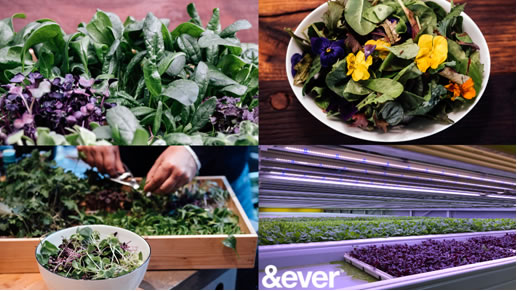&ever opens the first large-scale indoor vertical farm in the Middle East
After its R&D farm in Hamburg, indoor vertical farming startup &ever (previously Farmers Cut GmbH) opens its first commercial indoor vertical farm in Kuwait. The facility with app.
3000sqm growing (or faming) space has a daily output capacity of up to 550kg of salad, herbs, and cresses. The revolutionary Kuwaiti farm is the result of a joint venture between &ever and Kuwait’s NOX Management, which focuses on the food and beverage sector in the GCC and is part of the IFA group.

Kuwait, a country that previously relied on European and overseas imports for most of their greens and herbs, can now locally grow up to 250 varieties of greens and herbs using &ever’s Dryponics technology.
&ever produces high-quality and sustainable crops indoors which increase the nutritional quality and decrease environmental impact. The cutting-edge vertical farming method uses 90 percent less water compared to traditional farming, 60 percent less fertilizer, and zero pesticides. Using a sustainable “farm to fork” model, &ever’s technology is able to preserve the plants’ nutritional value until the produce reaches the customer.
Patented Dryponics technology and revolutionary farm design
&ever developed the Dryponics system, a unique method of growing salad indoors. Dryponics essentially keeps the plants alive, with the roots intact, until the final moment before consumption. By keeping the root of the plants dry, it allows the consumer to harvest the greens only seconds before consumption since the root stays with the plant from farm to table. The result is truly fresh, nutrient-rich, great tasting greens. Normally, green leaves lose most of their nutritional value after being washed in chlorine, chilled, packed, stored in warehouses, and then sent on the road for transportation – many times across thousands of kilometers. Even traditional organic labeled foods
can contain pesticides.
What sets &ever apart from its competitors is its revolutionary farm design. It aims at being the most energy-efficient indoor vertical farm and hence the most environmentally friendly. Key levers are the use of insulated climatized rooms, a high degree of automation, and an AI-based continuous improvement cycle.
Standing on the shoulders of “German Engineering” giants
Whilst &ever is an agile team of 40 employees, it has built partnerships with “German Engineering” giants Viessmann, Jungheinrich, and SAP to ramp up its complex technology more quickly.
&ever has partnered with Viessmann Refrigeration Solutions to develop highly efficient climatized rooms which are used in its indoor vertical farm. The technology is 40% more energy-efficient than other indoor vertical farming systems when it comes to energy use for climatization.
Jungheinrich is the intralogistics partner of &ever and designed and implemented the materials handling system. This enabled an optimized flow and protection of the valuable product through the farm. Its global deployment team helped &ever to ramp-up its new farm in Kuwait within only eight months.
To build its operating system, &ever Cloud, &ever uses the SAP Business Technology Platform -- SAP HANA inmemory platform and SAP Cloud Platform. &ever farmers can monitor, analyze, and adjust hundreds of data points on plant health, airflow, light, carbon dioxide levels, humidity, and temperature in real-time.
&ever is ready to roll-out globally
Building on the global deployment capabilities of its key partners, &ever will scale its operations quickly and globally. “Our vision is to bring better tasting greens with high nutritional value to more and more people”, says Mark Korzilius, Founder of &ever. “We have an interesting pipeline of opportunities around the globe”, adds Dr. Henner Schwarz, CEO of &ever. “We hope to be able to travel internationally again soon to get our next farms live as quickly as possible”.
Active role in global movement to transform food production
&ever’s focus is on better tasting food that is grown hyper-locally. With its advanced systems it helps to overcome some of the challenges traditional agriculture is facing today, such as the ever-increasing need for farmland, high use of clean water, and extensive spraying of pesticides.
Comments (0)
This post does not have any comments. Be the first to leave a comment below.
Featured Product


